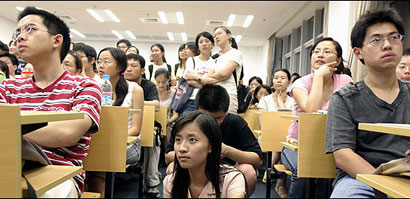|
Gay Chinese a presence but discreet in Hong Kong
(Shanghai Daily)
Updated: 2005-12-31 09:26
Jervois Street runs through what looks like an ordinary Hong Kong
neighborhood with sleepy car repair shops and tiny noodle eateries.
But as night falls it gets a makeover, becoming one of the few places in town
where the gay community can be seen relaxing and partying in public.

A class on gay and
lesbian studies at Fudan University in Shanghai has attracted an overflow
crowd. The class is the first ever of its kind in China. [The New York
Times] |
Every weekend, two trendy gay bars -
probably the first such establishments in Hong Kong to open on the street front
- draw flashy cars, celebrities, designers and masses of men in silk shirts and
tight tank tops. As the evening wears on, the surging crowds spill out on the
sidewalk, drinking and socializing.
Hong Kong may be among the most cosmopolitan of Asian cities, but its pink
economy remains largely underground.
Unlike Jervois Street, most of the sprinkling of openly gay or gay-friendly
clubs and karaoke bars are discreetly tucked away in alleyways or upstairs of
buildings.
Like the clubs they patronize, most homosexuals in Hong Kong prefer not to
draw attention to their sexual preference, despite apparently improving
tolerance and emergency of the gay rights movement over the past decade or so.
In the genteel Boris and Matthew bar, many youths leaning against each other
and hunching over drinks intimately will have to hide their sexuality from the
world. But Herman Au is an exception.
The tanned, fashion-savvy 24-year-old event organizer said he came out to his
family a year ago, and has never suffered any discrimination in the workplace.
"My whole company knows. I don't ever have to hide myself," he said,
admitting however that his parents are "definitely more open-minded" than most.
Even so, Au said he has had to coax his mother into accepting that she would
never have any grandchildren. The family is the single most important unit of
society in Chinese culture, and knowledge that their sons will never form a
family or fulfill their perceived duty in continuing the family line is
immensely difficult for most Chinese parents to accept.
|